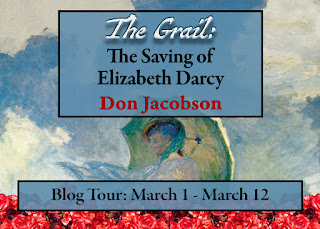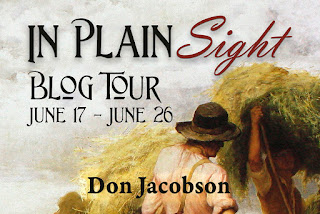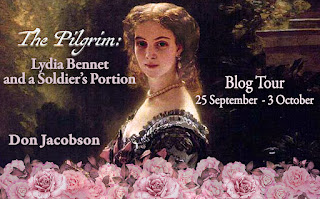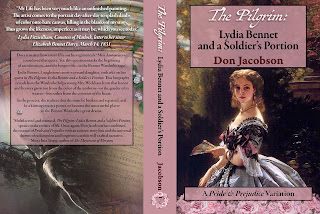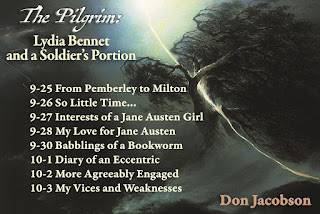Don Jacobson visits us today with the latest in the Bennet Wardrobe series.
If you're new to this series, let me explain a little about it:What is the ‘Bennet Wardrobe’? Well it’s literally a wardrobe, but it’s no ordinary piece of furniture. It can transport people of the Bennet bloodline forward in time for a period, and then transport them back to their original time. The time traveller doesn’t get to choose when they travel to; it’ll take them to a period that will teach them something they need to know.
This story is Lydia's.
* * *
Book Description
“My life has been very much like an unfinished painting. The artist comes to the portrait day-after-day to splash daubs of color onto bare canvas, filling in the blanks of my story. Thus grows the likeness, imperfect as it may be, which you see today.”
Lydia Fitzwilliam, Countess of Matlock, letter to her sister
Elizabeth Bennet Darcy, March 14, 1831.
Does it matter how a man fills out his regimentals? Miss Austen never considered that query. Yet, this question marks the beginning of an education…and the longest life…in the Bennet Wardrobe saga.
Lydia Bennet, Longbourn’s most wayward daughter, embarks on her quest in
The Pilgrim: Lydia Bennet and a Soldier’s Portion. This biography reveals how the Wardrobe helps young Mrs. Wickham learn that honor and bravery grow not from the color of the uniform—or the gender of its wearer—but rather from the contents of the heart.
In the process, she realizes that she must be broken and repaired, as if by a kintsugi master potter, to become the most useful player in the Bennet Wardrobe’s great drama.
“Multifaceted and nuanced,
The Pilgrim: Lydia Bennet and a Soldier’s Portion, speaks to the verities of life. Once again, Don Jacobson has combined the essence of Pride and Prejudice with an esoteric story line and the universal themes of redemption and forgiveness in this well-crafted narrative.”
Mirta Ines Trupp, author of The Meyersons of Meryton
Guest Post from Don Jacobson - Roses in the Bennet Wardrobe’s World
It all started with Sir William Lucas.
Seriously.
For some reason I latched onto the old shopkeeper’s introduction of the Bennet sisters at the Meryton Assembly as alluding to their beauty. In the Bennet Wardrobe’s universe, those words were “the Five Roses of Hertfordshire.” My mind has its own way of processing information.
In my house, carnations are considered the more beautiful bloom. Yet, the scent of roses are incomparable. And, I have a veritable forest (Vita Sackville-West would have words with me about pruning if the good lady were still in this world) of rosebushes lining my front walk. But the rose imagery came to the forefront early in 2016 when I was working on the first novel in the Bennet Wardrobe Series,
The Keeper: Mary Bennet’s Extraordinary Journey.
I began considering the rose hagiography early on. For me, it was ascribing a flower to be an emblematic ideal. For instance, many authors have idealized Pemberley’s gardens as being the enduring legacy of Lady Anne Darcy. I imagined that the family memorialized her by naming the delightful sunshine-colored cultivar, the yellow, as the Lady Anne.
I am impressed with the beauty of a pure yellow rose…and so are we all by Jane Bennet’s classic looks. Thus, the Lady Anne became her flower.
As for Elizabeth…we become aware of Darcy ordering a vase of deep red roses…Lizzy’s Own Red Bourbons…placed daily on a table outside of her chambers, unused after those awful days in 1836. Of course, these had been her favorites—and, thus, his—throughout her life. The crimson petals complemented her chocolate, near black eyes and rich brunette locks. Thus, the classic Red Bourbon variation created by Lydia Fitzwilliam was inscribed on Elizabeth’s escutcheon, matching her impertinent statement for impertinent statement.
Of course, flowers also have their own symbolic meanings.
Once I became enamored of using the roses to represent the Bennet women (ah-hah! Not Daughters, but Women), I had to consider the others.
My cover designer and artistic muse, Janet B. Taylor suggested using white to represent Mary’s purity of spirit. You have no idea how that changed my perspective. I had been considering Mary as the bush in winter from which summer’s beauty would spring. Brown canes are not very appealing and tended to confirm the hidebound point-of-view that most in the #Austenesque world had been taking of the middle daughter.
Giving Mary her own flower allowed me to visualize the beauty that was resting inside of her. No longer the root plant (although as The Great Keeper, Mary Bennet Benton ensured the Wardrobe’s integrity and the health of the Bennet Family Trust.), Mary now could be transformed into the woman she was truly meant to be.
Inside of the character study of the man who would become Kitty’s love interest after she translates to the future, Henry Fitzwilliam’s War, we encounter the young Viscount recalling his time as a little boy walking with his Great-Grandmother, the Dowager Countess. He asked her about the roses. Lydia recounts the roses for each of her sisters as I have above. Then the child asks about Aunt Kitty. Lydia replies:
“All of them. Every plant and bloom here in Selkirk, over at Thornhill and Pemberley, down at Longbourn, and most especially on the fieldstone wall in front of the House at Deauville reminds me of my most beloved sister.”
The cult of the rose, I discovered as I worked with the Wardrobe, did not originate with the Bennets but rather with the Gardiners. As we discovered in
The Avenger: Thomas Bennet and a Father’s Lament, Mrs. Bennet brought roses to Longbourn shortly after her marriage to Thomas. She was replicating her mother’s plantings behind the Gardiner home on Meryton’s High Street.
The bushes Fanny brought to Longbourn included cuttings from the original plants (rosa chinensis) brought from China by her three-times great Grandfather. That Mr. Gardiner was a trader’s clerk and settled in Meryton following his master, Christopher Bennet, in abandoning the Honorable East India Company for the gentle climes of Hertfordshire. The tangerine hued r. chinensis flowered (sorry for the greensman’s pun) in the person of Frances Lorinda Bennet.
Given her sensual nature, Lydia’s rose required a bit of thinking. The “usual” colors were already serving her elder sisters. I was at a quandary. Except that each morning I strolled past my rosebushes. The blossoms were entrancing, particularly the blush-colored ones. Those, I imagined, were redolent of Lydia’s cheeks when well-loved by Wickham, Richter, or Fitzwilliam. Its fragrance was delightfully potent, filling my kitchen after I clipped a few and reminding me of the powerful woman the Wardrobe’s Lydia was destined to become.
Blush it was for her.
There is one bit of floral arrangement I would wish to address…the garlands that stretch across the bottom of the front cover (print and e-book) and the wreath surrounding the volume number on the print book spine.
I will admit that there are breadcrumbs scattered all over the covers for the
Bennet Wardrobe stories. Sometimes they can be found in the covers themselves—for instance, the garland on
Henry Fitzwilliam’s War is made of red poppies, the everlasting symbol of the sacrifice made by the soldiers of WWI.
The wreaths surrounding the volume numbers (there is none on Henry Fitzwilliam’s War as it exists only as an e-book) are either incomplete or complete. In some cases—where the life of the character is barely started—as in
Lizzy Bennet Meets the Countess—the garland has but two or three roses. Otherwise the garlands are broken (as on
The Exile: Kitty Bennet and the Belle Époque) or complete (as on
The Exile: The Countess Visits Longbourn) depending on how far the reader is able to follow the title character’s life.

The cover garland for
The Pilgrim: Lydia Bennet and a Soldier’s Portion offers other variations. Three roses in the garland are larger, representing the men in her life. Several of them have tear droplets showing the veils through which the youngest daughter had to pass.
The rose iconography in the
Bennet Wardrobe stories offers, I hope, a subtext which enhances the overall experience readers have with the arc.
Please enjoy this excerpt from
The Pilgrim: Lydia Bennet and a Soldier’s Portion, the seventh book in the arc of the Wardrobe stories.
Excerpt from The Pilgrim: Lydia Bennet and a Soldier’s Portion
Hauptmann
Hans Richter, having lived at the Beach House for over one year, has
begun to explore rising feelings for the widowed Mrs. Wickham. His
affection for her son, Georges Henri, has helped smooth his path.
Having been given Lady Kate’s blessing to court, the couple has
left the Beach House for an outing in the ancient fortress city of
Caen.
The road from Deauville to Caen
trended south and west through farmland separated by great hedgerows
thickened over the centuries. A sunny day, the great orb warmed their
backs as the KW roared down the track, sparsely populated with
lorries, other military vehicles, and the odd civilian auto. The
whine of the engine and the rush of the wind around the open cab
precluded conversation.
That did not mean that Lydia could not
look at and appreciate the man next to her. Unlike his companion, her
head wrapped in one of Kitty’s brilliant Hermes scarves and her
body protected by a scarlet car coat, Hans Richter had pulled on a
leather jacket which remained unzipped as they bounced along. His
unstarched shirt collar points snapped up and down in the slipstream,
offering a creamy counterpoint to cheeks ruddied above his
preternatural tan.
His long fingers wrapped the Bakelite
steering wheel, securely guiding the bucking four-seater over the
bleached tarmac. Lydia watched, one eyebrow rising when his lanky
frame, jack-knifed into the bucket seat, flexed and shifted as the
vehicle responded to the bumps inherent in Normandy’s
indifferently-maintained roads. From time-to-time, his left leg
stabbed into the well as he worked the clutch to down-shift as they
were forced to slow for traffic or move the transmission into top
gear to launch the KW when the road cleared.
She resisted the urge to stroke his
right thigh as the muscles tensed and relaxed, bulging his powerful,
paratrooper quadriceps.
Lydia’s eyes, often focused upon the
scenery as it flew past, would, however, drift back to caress him
with their velvet fingers. For his part, Richter would turn her way
and, from time-to-time, throw a brilliant grin, his even teeth
blinding in the midday sun.
Oh, to be young and without care, if
only for a moment.
Mrs. Wickham had taken both Kitty’s
lessons as well as her own ruminations to heart. She would be that
calm center—no, not like Jane as seen by Darcy, but
rather the soaring mistress of the drawing-room, Miss Bennet of the
calm and still waters running deeply as she quelled a fractious
crowd—that would draw Richter into deeper communion. She would
neither entice him nor use her arts and allurements to bend
him to her will.
He would move from storge to
agape without the need for either the Fifth or Sixth Loves…or
he would not. Eros would come eventually.i
Or it would not.
Too much time devoted to wondering
what could be would ultimately detract from the immediacy of what
was.
* * *
Caen was impossibly ancient. The Dukes
of Normandy long called the city home, consolidating their power
around the old port built where the Orne had poured into the Channel.
Now, however, with a thousand years of sediment filling in the
estuary, Caen like its old trading partner, Bruges, further north was
land-locked, ceding its pre-eminence to the aptly-named metropolis of
Le Havre.
Much as Vienna was an imperial city
without an empire, Caen was a warlord’s domain without his august
self, lands, knights, or peasants. Yet, the Château de Caen
attracted crowds of German tourists—mostly day-tripping Wehrmacht
non-coms—who were stunned by the inherent power of Duke
William’s massive castle. If they were not able to travel to
Berlin or Nuremberg to delve into Albert Speer’s architectural
musings, German soldiers could, none-the-less, marvel at a structure
that had already endured 900 years, a scant century shorter than the
Führer’s promise for the Reich.
Lydia and Hans parked the KW near the
Caen Kommandantura before crossing into the center of town to
climb up to the fortifications built on a rise, once remote and now
overlooking encroaching houses and shops. They passed through the
great gatehouse—the Porte des champs—that had overlooked
the sprawling grain fields that fed William’s cavalry.
Massive blocks of granite and
limestone could only hold so much appeal to a pair of young people
using sightseeing as the medium to learn more about one another.
Lydia eventually expressed weariness and begged a demitasse et
petits fours before they searched out a suitable spot to dine al
fresco. They retraced their steps back into town.
As they entered the place de la
ville, two sides of which were occupied by a great church and the
hôtel de ville, they spied several cafés huddled beneath the
eaves of old, but well-maintained, buildings. As t’was just past
the noon-hour, most tables were taken by businessmen, merchants, and
others who navigated around the edges of Occupation France’s
officialdom.
Lydia cast a worried look at the busy
restaurants and said to Richter, “Hans, this seems to be an idea
doomed to fail. I cannot see any open seats. Perhaps we should just
get the car and head down the river road.
“I did so wish to rest my feet,
though.”
Her weary appeal set Richter’s head
to swiveling as he scanned the terrace. His eye caught a small
two-seater in the far corner, directly against the building.
Tactically, this would have been the table he would have chosen if
the entire café had been empty. While not the most obvious, this
little table had a commanding view of the entire place.
Better to see than be seen.
Firmly gripping Lydia’s hand,
Richter made his way to the tiny two-top, weaving around protruding
elbows and bowed chairbacks. He did not bull his way across as would
many of his kind living and breathing the assumption that they had
greater rights than others thanks to their successful conquests. He
was polite: numerous utterances of pardonnez-moi, m’sieur or
‘schuldigung mein Herr floated behind the couple as they did
their best to avoid unduly disturbing others.
Once settled at their table, Lydia and
Hans placed their order, the same as they would have at Villet’s…café
et deux macarons et deux eclairs…ample food to keep Richter’s
Fallschirmjäger and Lydia’s farmgirl appetites at
bay.
The conversation, after all, was what
was important. Much of what passed between them would have been
accounted as bordering on meaningless little nothings. T’was true
that, if exchanged between two persons who only had met this day,
such bon mots would have been accounted as idle chit-chat.
However, this courting couple would—and did—discover even idle
words would illuminate their understanding of the object of their
affection. Mrs. Wickham and Hauptmann Richter were oblivious
to all persons surrounding them in the café or passing by in pursuit
of their business in the old town. Their heads were bent together as
they chatted and nibbled and sipped.
In their newfound bliss, Lydia and
Hans ignored that which would have been obvious to any observer. The
streets of Caen were not those of Deauville. What was accepted as
perfectly normal in the pâtisserie Villet rankled, disgusted,
and left the bitter taste of incipient collaboration within the
breasts of those who only saw a filthy bosche and his consort
whiling away an afternoon.
Two pairs of eyes grimly watched the
man and the woman. When the couple rose to leave, the men,
near-identically dressed in shapeless umber pants and jackets, their
caps pulled low to hide their observational focus, tailed them,
walking beside bicycles ever-present in a petrol-starved world. Their
hearts were hardened by the exigencies of war. Keen deep-set eyes
were narrowed in hate. The watchers carefully noted which Kübelwagen
ferried the blonde woman and the equally tow-headed German away
from Caen and down the Orne River Road.
They did not follow: neither had
ridden the Tour de France. Besides, they did not know if the bosche
in mufti was a big fish or small fry. The woman was unimportant,
likely a whore who would be purged once the nation’s soul was
cleansed of the stain of June 1940. They had questions which needed
answers as these were new and unfamiliar players on the invisible
board where black and white pieces only left the field through death
and destruction. Surprise and indiscriminate terror were their tools.
One of the men approached a motor pool
Unteroffizier and exchanged a few friendly words, a bottle of
something labeled Monnet cognac but almost certainly not the
bonafide nectar, and two packages of American cigarettes, the
leavings from a late-night gift launched from a low-flying Stirling.
Stranded in the Autolaager for long hours with nothing to see
but greasy crankcases and leaking gaskets, the corporal became
gossipy, especially with those who fed his smoky alcoholism.
The two maquisards walked away
knowing that the suspect KW belonged to the Deauville Kommandantura.
Its most frequent passenger, a blue-chip target, was a
full-blown German Oberst, a Graf of the old blood.
i
After January 1815, with Mr. Bennet’s death, Lydia had become her
mother’s companion and had listened to the lady expound on all Six
Loves.
* * *
Author Bio
Don Jacobson has written professionally for forty years. His output has ranged from news and features to advertising, television and radio. His work has been nominated for Emmys and other awards. He has previously published five books, all non-fiction. In 2016, he began publishing
The Bennet Wardrobe Series—
The Keeper: Mary Bennet’s Extraordinary Journey (2016)
Henry Fitzwilliam’s War (2016)
The Exile: Kitty Bennet and the Belle Époque (2017)
Lizzy Bennet Meets the Countess (2017)
The Exile: The Countess Visits Longbourn (2018)
The Avenger: Thomas Bennet and a Father’s Lament (2018)
The Pilgrim: Lydia Bennet and a Soldier’s Portion (2019)
Jacobson is also part of the collective effort behind the publication of the upcoming
North and South anthology,
Falling for Mr. Thornton: Tales of North and South due out in the Fall of 2019.
Other Austenesque Variations include the paired books “
Of Fortune’s Reversal” (2016) and “
The Maid and The Footman.” (2016)
Lessers and Betters offers readers the paired novellas in one volume to allow a better appreciation of the “Upstairs-Downstairs” mentality that drives the stories.
Jacobson holds an advanced degree in History with a specialty in American Foreign Relations. As a college instructor, Don teaches United States History, World History, the History of Western Civilization and Research Writing.
He is a member of JASNA. Likewise, Don is a member of the Austen Authors collective (see the internet, Facebook and Twitter).
He lives in the Las Vegas, Nevada area with his wife and co-author, Pam, a woman Ms. Austen would have been hard-pressed to categorize, and their rather assertive four-and-twenty pound cat, Bear. Besides thoroughly immersing himself in the JAFF world, Don also enjoys cooking; dining out, fine wine and well-aged scotch whiskey.
His other passion is cycling. Most days from April through October will find him “putting in the miles” around the Seattle area (yes there are hills). He has ridden several “centuries” (100 mile days). Don is especially proud that he successfully completed the AIDS Ride—Midwest (500 miles from Minneapolis to Chicago) and the Make-A-Wish Miracle Ride (300 miles from Traverse City, MI to Brooklyn, MI).
Connect with Don
Buy Links
The Pilgrim is available to buy now in paperback, kindle and kindle unlimited:
Giveaway Time!
Don is giving away 4 eBooks of
The Pilgrim: Lydia Bennet and a Soldier’s Portion. To enter, please use the rafflecopter below.
I love to read your comments, but a few blog visitors have reported difficulties in commenting while using the Safari browser. If you are unable to comment, please try using another web browser, such as Google Chrome, or please
contact me and I will add your comment for you :)
3
Oct
My
Vices and Weaknesses
* * *
If you don’t want to miss any of my future posts, please subscribe:
Subscribe to Babblings of a Bookworm
If you'd like to be friends on
Goodreads then please
invite me - just say that you visit my blog when it asks why you'd like to be friends with me.


